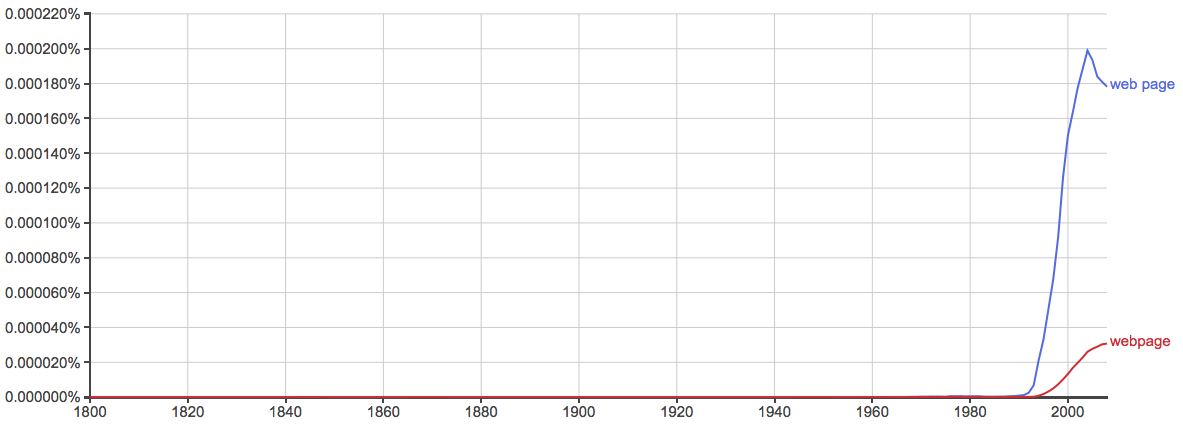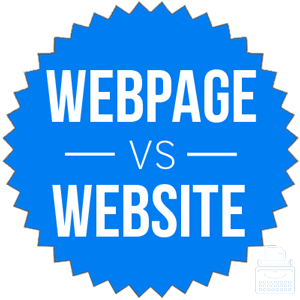Languages evolve to suit the needs of the people who use them. In today’s modern digital age, we have many words that were not needed several centuries (or even several months) ago.
Website and web page are very relevant words to everyday life in modern times, even if writers like William Shakespeare, Thomas Paine, and Charles Darwin wouldn’t have known what to do with them. But do we really need both of these words? Is there even any difference between them?
What is the Difference Between Web Page and Website?
In this post, I will compare web page vs. website and use each term in several example sentences, so that you can see how they are likely to appear in context.
Plus, I will show you a memory tool, called a mnemonic device, that makes choosing website or web page a bit simpler.
When to Use Web Page
 What does web page mean? A web page is a document on the Internet. This word is a noun.
What does web page mean? A web page is a document on the Internet. This word is a noun.
A web page can include any of various types of content, including text, images, video material, or other sorts of code. It could also be blank. Web pages can be online news sources, social media, official postings, advertisements, or a variety of other things.
Each web page is an online location mapped to a specific address, or URL, like https://writingexplained.org/free-ebook-35-mistakes.
Here are some examples of web page in actual sentences,
- Emily printed a coupon for a free electric drill from a web page on the Internet.
- Bryan started a web page entirely devoted to photos of geriatric monkeys.
Is web page two words? As with most English questions, the answer depends on whom you ask. Some usage authorities say the one-word spelling, webpage, is preferred. This seems to make the most sense, especially given the continued rise in the one-word website over Web site and web site.
Still, if popular use means anything, the two-word web page is much more common. Bryan Garner, in his book Garner’s Modern English Usage, estimates web page to be six times more common than webpage, which is corroborated by the chart below.

This chart graphs webpage vs. web page in English books since the year 1800. As you can see, web page is several times more common. In fact, The AP Stylebook lists web page as the preferred spelling.
For the time being, stick with web page.
The plural of web page is web pages.
When to Use Website
 What does website mean? A website is a collection of web pages that are linked together. They usually share a common domain name, like https://writingexplained.org/. This website has many web pages, which are all different, but they are still part of the Writing Explained website.
What does website mean? A website is a collection of web pages that are linked together. They usually share a common domain name, like https://writingexplained.org/. This website has many web pages, which are all different, but they are still part of the Writing Explained website.
Similarly, the New York Times website has many pages, on which can be found various articles, columns, and other content. They are all grouped together under the umbrella of https://www.nytimes.com/.
For example,
- Bryan soon had too many photos of geriatric monkeys for a single webpage, so he categorized them on separate webpages according to species and organized them into an entire website on geriatric monkeys, which has had dozens of visitors.
- Jen was horrified to find out that her website was hacked and used to distribute malware to all of her unsuspecting visitors.
Trick to Remember the Difference
 A web page is a single document on the Internet, like https://writingexplained.org/confusing-words. A website is a collection of many web pages all linked together.
A web page is a single document on the Internet, like https://writingexplained.org/confusing-words. A website is a collection of many web pages all linked together.
Website and spider each contain the letter S. Just like a spider’s web consists of many strands of silk connected together, a website consists of many distinct web pages connected together.
Summary
Is it web page or website? In the digital age, it is important to know the difference between these terms, even though they are often interchangeable in informal speech.
- A web page is a single document on the Internet.
- A website is a collection of many web pages linked together under one domain.
Contents
